

'My neighbourhood is being destroyed to pacify his supporters': the race to complete Trump's wall. One, two, tree: how AI helped find millions of trees in the Sahara. When a team of international scientists set out to count every tree in a large swathe of west Africa using AI, satellite images and one of the world’s most powerful supercomputers, their expectations were modest.
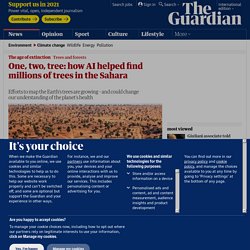
Previously, the area had registered as having little or no tree cover. The biggest surprise, says Martin Brandt, assistant professor of geography at the University of Copenhagen, is that the part of the Sahara that the study covered, roughly 10%, “where no one would expect to find many trees”, actually had “quite a few hundred million”. Trees are crucial to our long-term survival, as they absorb and store the carbon dioxide emissions that cause global heating. Concussion sufferers twice as likely to develop brain diseases, study finds. People with a history of concussion are more than twice as likely to develop a neurological disease, according to a new study that gathered the largest ever dataset on the syndrome in the UK.
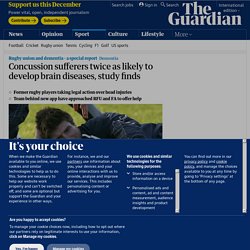
The study, from the team behind a new dementia screening app, Mindset4Dementia, has released its findings showing a significant correlation between concussion and brain disease after the Guardian revealed this week that a group of former professional rugby players are taking legal action against the sport’s governing bodies for negligence in their failure to protect them from long-term brain injuries caused by head trauma during their careers. The legal firm representing the players says that it has have been in contact with as many as 100 retired players from across rugby union and rugby league who are suffering from some degree of neurological impairment. The team behind the study believe the app could develop into a crucial tool to help with the early diagnosis of both dementia and CTE. 'I'm pleased it is being used for people's safety': QR code inventor relishes its role in tackling Covid. The eureka moment that helped Masahiro Hara perfect the Quick Response, or QR code, sprang from a lunchtime game of Go more than a quarter of a century ago.
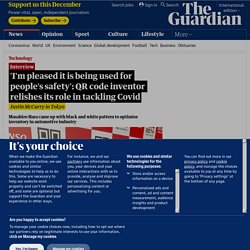
He was playing the ancient game of strategy at work when the stones arranged on the board revealed the solution to a problem troubling the firm’s clients in Japan’s car industry – and which is now being repurposed as a weapon in the fight against the coronavirus pandemic. Workers wanted a less labour-intensive way to store more information, including kana and kanji characters, but the barcodes then in use could hold only 20 or so alphanumeric characters of information each. In some cases, a single box of components carried as many as 10 barcodes that had to be read individually. Having helped develop a barcode reader in the early 1980s, Hara knew the method had its limitations. The Capital of Sprawl Gets a Radically Car-Free Neighborhood. Arizona — for all the scorn heaped upon it by, ahem, car-despising coastal elites in professions like journalism — is actually a magnet for housing innovation.
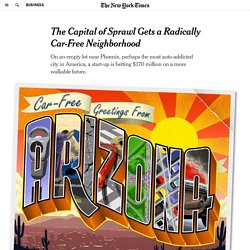
Like the rest of the West, the state boomed after World War II, attracting residents and industries as white Americans suburbanized and the baby boom commenced. In the dominant Phoenix region, which accounts for about two-thirds of the state’s population, growth was steered by a cabal of civic boosters and Chamber of Commerce men, who courted out-of-state employers by hoovering up federal infrastructure dollars and fostering a good “business climate” — that is, they kept unions weak, taxes low and regulation minimal. The mix of fast growth and low-key rules has given Phoenix a reputation for being “the petri dish for housing experiments.” Plastic pollution: Kayaks used to clean the sea. CHIRLA Immigration Policy and Advocacy - Investing in Immigrants. 'They wanted to drown me at birth - now I'm a poet'
Born in an Indian village with cerebral palsy, Kuli Kohli was lucky to survive.

Neighbours told her parents they should throw her in the river, instead they brought her to the UK. As she grew up here, writing became her means of escape - and transformed her life in ways she never expected. Waiting to be called on stage in her home town of Wolverhampton, Kuli Kohli felt sick with anxiety. She was petrified her words wouldn't come out and worried she would fall flat on her face. Her heart soared and her nerves clattered. The Microwave: Conduit for Women in the Workplace. The power of music: Vicky McClure's dementia choir. A million people in the UK are expected to be living with dementia by 2025.
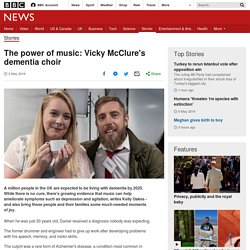
While there is no cure, there's growing evidence that music can help ameliorate symptoms such as depression and agitation, writes Kelly Oakes - and also bring these people and their families some much-needed moments of joy. When he was just 30 years old, Daniel received a diagnosis nobody was expecting. The former drummer and engineer had to give up work after developing problems with his speech, memory, and motor skills. Octavia Spencer Electrifies Treatment Court Community - ADVANCEJUSTICE. Norway and the A-ha moment that made electric cars the answer.
In 1995, the lead singer of the 1980s band A-ha and the head of the Norwegian environmental group Bellona climbed improbably into a converted electric Fiat Panda they had imported from Switzerland and set off on a road trip.
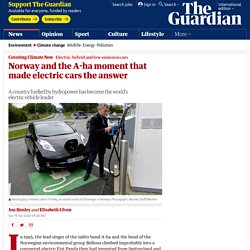
They drove around Oslo refusing to pay the city’s sky-high road tolls, parking illegally wherever they could, and ignoring every penalty notice they were given. Eventually, the authorities impounded their car and auctioned it off to cover the fines. But the stunt attracted massive media attention, and the point was made. Soon after, electric vehicles were exempted from road tolls, one of a large raft of incentives that have, over the years, helped make Norway the country with the world’s highest per capita electric vehicle ownership. Tru Earth Laundry Strips - Eco-friendly Laundry Detergent Sheets - Tru Earth Laundry Strips - Eco-friendly Laundry Detergent Sheets. Can we fix it? The repair cafes waging war on throwaway culture. A vacuum cleaner, a hair straightener, a laptop, Christmas lights, an e-reader, a blender, a kettle, two bags, a pair of jeans, a remote-control helicopter, a spoon, a dining-room chair, a lamp and hair clippers.
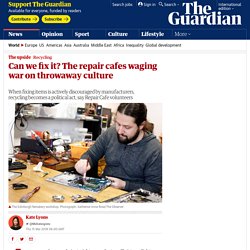
All broken. It sounds like a pile of things that you’d stick in boxes and take to the tip. In fact, it’s a list of things mended in a single afternoon by British volunteers determined to get people to stop throwing stuff away. This is the Reading Repair Cafe, part of a burgeoning international network aimed at confronting a world of stuff, of white goods littering dumps in west Africa and trash swilling through the oceans in huge gyres.
The hair clippers belong to William, who does not want to give his surname but cheerfully describes himself as “mechanically incompetent”. William looks sheepish; Haycock looks pleased. India slashes heatwave death toll with series of low-cost measures. One morning last week, Mohammad Javed wheeled an air conditioner on to the pavement outside his catering business in Delhi, placed his chair a metre away, sat down and did not move all day. When the machine ran out of water, he asked passing boys to fetch a bucket. When he had to give directions to workers in the building across the lane, he shouted. Every few minutes, he took a long swig from his water bottle and spat the contents on to the ground without swallowing.
“Ramadan,” he explained. How to fix the gender pay gap? The firm that pays everyone the same. When the government forced all UK businesses over a certain size to publish their gender pay gap figures last year, many red-faced chief executives struggled to justify why the men they employed were earning so much more than the women.
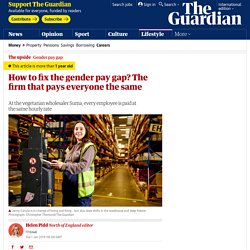
Not so at the ethical wholesaler Suma, which says it is the largest equal-pay co-operative in Europe. First, because it doesn’t have a CEO. And second, because all of Suma’s 190 employees, or “members” , earn exactly the same: £15.60 an hour, equating to £33,000 for a 35-hour, five-day week, plus bonuses and shares. String of British firms switch over to four-day working week. A string of small British firms have switched their workers over to a four-day week, the Guardian can reveal, amid mounting political interest in the idea that working less could deliver higher productivity and better balance between life and work.
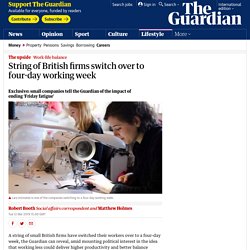
A lingerie manufacturer, a lighting design firm and a landscape architect are among a wave of employers experimenting with giving staff three days off per week, for no less pay. The Wellcome Trust, the largest employer in Britain to so far consider a four-day week, is thinking about doing a trial for its 800 staff. Growing calls for a shorter working week are being opposed by the Confederation of British Industry on the basis that more flexibility, not less, is needed. But the shadow chancellor, John McDonnell, has commissioned a study into its value from the economist Robert Skidelsky, and the Scottish National party is due to debate a motion next month calling for a review which could lead to the introduction of the four-day week in Scotland. Boston’s miracle: how America stopped young men killing each other. Stacy Spell is trying to save lives. The 20-odd youngsters ranged in a semicircle in front of him are healthy enough.
But most are on a path towards early death. “If any one of you drops a body, your whole group will be targeted,” Spell booms, pacing the room like a public defender in a courtroom. “Even if you weren’t there, we will come after you.” The youths don’t move. Wireless in Gaza: the whizz-kids making code not war. It’s a scene straight from a Silicon Valley startup. Hot-desking twentysomethings type code into laptops covered with stickers. Retro Pac-Man graffiti and motivational slogans like “DO EPIC THINGS” adorn the walls.
Bookshelves are filled with the tech classics: The Facebook Effect and The Founder’s Dilemmas. Wifi routers hang overhead, as do Edison bulbs, emitting more style than actual light. But this is not the San Francisco Bay Area. Treatment courts are justice reform - Justice For Vets. When it actually is rocket science: SkyReal Suite for aerospace design. In recent years, we’ve seen a surge in the use of virtual reality for industrial design including aircraft and other vehicles. But while aerospace engineers might understand the benefits of designing in VR, they tend to focus their talents where they’re needed: toward the efficient development of quality aircraft and spacecraft. Taking the time to learn new tools for VR could be considered an unnecessary distraction.
This is where SkyReal comes in. The Paris-based company builds custom Unreal Engine-based VR solutions for aerospace clients like Airbus, ArianeGroup, and STELIA Aerospace, where engineers can edit design, experiment, and collaborate in a way that feels natural to them without special training. “Physical prototyping can be complex and expensive for these large-scale projects, but the engineers and other stakeholders want to be able to feel and touch the design,” explains Hugo Falgarone, CEO and Founder of SkyReal. Cornell University partners with industry on a new approach to urban design and planning. Race/Related: How I Tried to Ditch Africa’s Tropes.
The boss who put everyone on 70K. Image copyright Gravity. BBC Radio 4 - The Fix - Available now. Talking to your neighbours is mandatory if you live here. 'Until I met my debt mentor, I couldn't always feed my kids' An 'unhappy marriage' that has saved thousands of lives. Arranged marriages can often throw up surprises. Uma Preman's unhappy marriage transformed not only her life, but also the lives of thousands of others - because it left her with the skills and motivation to help disadvantaged Indians gain access to medical treatment.
The moment. How mattresses could solve hunger. Are Danish people really happy? Nordic work-life balance secrets. How Biophilic Learning Environments Boost Student Achievement. Columbus, Indiana: The Rust Belt Didn’t Have to Happen. James Fallows: Democrats should talk about place-based policy. ‘No men allowed’ – the gym getting women fit and into work. Snow machines and fleece blankets: inside the ski industry’s battle with climate change. Why Germany Is So Much Better at Training Its Workers. The prize app designed to help deaf children in school. Seychelles: The island nation with a novel way to tackle climate change. Quadratic Equations - Quadratic Equations How to Solve. A mathematician at Carnegie Mellon University has developed an easier way to solve quadratic equations.The mathematician hopes this method will help students avoid memorizing obtuse formulas.His secret is in generalizing two roots together instead of keeping them as separate values.
Doctors in Spain revive British woman after six-hour cardiac arrest. European plan to tackle space debris? Hug it out. 'We’ve become like a family': innovative groups help refugees settle in US cities. - Worklife - The young leaders tackling the world’s toughest challenges. China bans children from late-night gaming to combat addiction. How the people of Rochdale launched their own fightback against sexual abuse and poverty. 11 veterans set to move into Calgary ‘Homes for Heroes’ tiny home village - Calgary. Family of teenager who died from lethal ecstasy dose support drug legalisation. The '3.5% rule': How a small minority can change the world - BBC Future. If the shoo fits: cows painted with zebra stripes keep flies in line. Scientists Develop Gel That Can Regrow Tooth Enamel.
Wild wheat genetics offer climate hope for food crops. Life-saving surgery but not by a doctor. Defeat malaria in a generation - here's how. Can seaweed farming help fight climate change? – envirobites. Scientists discover way to ‘grow’ tooth enamel. Maths and tech specialists need Hippocratic oath, says academic. Farmer produces ethical king prawns in a Lincolnshire field. BrightVibes. Boston TenPoint Coalition. Holland covers hundreds of bus stops with plants as gift to honeybees. Toilet paper that builds toilets. Can seaweed farming help fight climate change? – envirobites. How Flatpack Democracy beat the old parties in the People’s Republic of Frome. Instituto Terra: A Replanted Forest That's Home to 500 Endangered Species. Choose Creativity – Powered By The Lulu & Leo Fund. LEAN IN CHINA 官网. Charleston Area Justice Ministry. Millennial Latinas - A Lean In Circle.
Defy Ventures, Inc. Prison Entrepreneurship Program. Equal Justice Initiative. Home. GRAIL - Detecting Cancer Early, When It Can Be Cured. Nurse-Family Partnership – Helping First-Time Parents Succeed. Milton Hershey School. Supporting Communities to End Child Marriage. Berkeley Underground Scholars. The Posse Foundation. 'It’s a miracle': Helsinki's radical solution to homelessness. Rebuilding our lives. Rebuilding our countries. How we’ll predict the next refugee crisis. NPR Choice page. Indiana school district turns unused cafeteria food into take-home meals for kids. 2018 Ethical Fashion Guide - Baptist World Aid Australia. At This Immigrant-Owned Restaurant in D.C, the Homeless Eat For Free. In the Future, Your Food Will Be Sweetened With Protein. 25-year-old Kenyan invents gloves that convert sign language into audio speech - Pulse Kenya.
The Landfillharmonic. How cooking and cleaning transformed a violent man. Solving the world's problems, one prize at a time. Ethiopia opens Africa's first waste-to-energy facility. US insurer sends public employees to Mexico for cheaper drugs. Spinal implant helps three paralysed men walk again. Leaving care: 'A spare room changed my life'